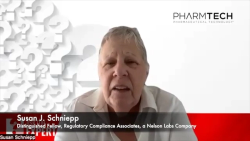
OR WAIT null SECS
- About Us
- Advertise
- Contact Us
- Editorial Info
- Editorial Advisory Board
- Do Not Sell My Personal Information
- Privacy Policy
- Terms and Conditions
© 2026 MJH Life Sciences™ , Pharmaceutical Technology - Pharma News and Development Insights. All rights reserved.
US Pharmacopeia Sets Five-Year Goals
Pharmaceutical Technology Europe
The US Pharmacopeia recently convened a meeting of stakeholders to set goals for its 2010–2015 cycle.
Every 5 years, the US Pharmacopeial (USP) Convention convenes a gathering of its member organisations (schools of medicine, pharmacy, and nursing; health practitioner organisations; federal, state, and international regulators; consumer organisations; manufacturer and trade groups; international representatives; and others). The recent USP membership meeting took place in Washington, DC, 21–24 April 2010. This was the best-attended USP Convention on record: 274 delegates and alternates, and a record number of representatives from Europe and elsewhere around the world participated in deliberations and discussions.
Delegates discussed USP's activities during the 5-year cycle from 2005 to 2010 and elected USP's officers and trustees, who have fiduciary responsibilities for the organisation, and the chairs of the Council of Experts. The latter are 20 experts who chair the committees (go to www.pharmtech.com/USPexperts for the full list of USP's 2010–2015 Council of Experts Chairs) responsible for developing and approving USP monographs, general chapters, and associated reference standards. Delegates also voted on amendments to USP's constitution and bylaws.
Delegates were focused on USP's public standardssetting activities by several prominent health leaders, including Margaret Hamburg, MD, commissioner of the FDA. Dr Hamburg recalled the close association between the FDA and USP since the former's founding in 1906, and she called for continued collaboration on public health issues, such as melamine contamination and diethylene glycol adulteration. Also addressing delegates were Michael Maves, MD, CEO of the American Medical Association; Thomas Menighan, CEO of the American Pharmacists Association, and Jennie Chin Hansen, President of the American Association of Retired Persons and CEO of the American Geriatrics Society. Speakers reminded their listeners that USP has much to contribute to patient care in the 21st century.
2010–2015 Resolutions
During the membership meeting, delegates voted to adopt nine resolutions that will guide USP during the next 5 years:
1. Grandfather constitutionally named organisations. Organisations named in the USP Constitution prior to the adoption of the amended Bylaws automatically become voting organisational members of the Convention under the new Bylaws.
2. Strengthen focus on core compendial activities. USP resolves to strengthen its focus on core compendial standards activities to ensure relevant, timely and accurate public standards.
3. Strengthen USP's relationship with the FDA. USP resolves to strengthen its relationship with the FDA, and to explore further mechanisms to provide and maintain up-to-date national standards for drugs and excipients.
4. Support and advance global public health initiatives. Working in consultation and collaboration with national, regional and global stakeholders, USP resolves to assess the feasibility and advisability of advancing global public health initiatives.
5. Strengthen and expand harmonisation efforts. USP resolves to strengthen and expand its efforts to work with stakeholders around the world to develop harmonised global standards.
6. Continue and expand commitment to quality standards for food ingredients. USP resolves to continue and expand its commitment to quality standards for food ingredients, working to strengthen the role of the Food Chemicals Codex as a global compendium for food ingredients.
7. Promote availability, use and recognition of quality standards for dietary supplements. USP resolves to continue its commitment to provide quality standards for dietary supplements.
8. Develop, maintain and promote adoption of quality standards for compounded medicines. USP resolves to continue its commitment to standards for compounding, working with stakeholders to develop and maintain optimal process and preparation standards, and promote adoption of such standards by compounding professionals and regulatory authorities.
9. Explore development of quality standards of value to practitioners and the public. USP resolves to explore the feasibility and advisability of assisting practitioner groups and other stakeholders to develop quality standards of value to practitioners and the public.
Conclusions
Following its 2010 convention, USP has clear and ambitious objectives to enhance the quality of drug and food substances and products, as well as those of dietary supplements in both domestic and international commerce. Further information about the convention is available on USP's website www.usp.org/meetings/convention and links therein).
Laura N. Provan is director, corporate communications at USP, 12601 Twinbrook Parkway, Rockville, MD 20852-1790, USA
Tel: +1 301 816 8268
E-mail: lnp@usp.org



